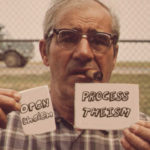We run our website the way we wished the whole internet worked: we provide high quality original content with no ads. We are funded solely by your direct support. Please consider supporting this project.
Doesn’t Psalms 139:16 refute the Open View of the future?
One of the passages most frequently cited in attempts to refute the open view of the future is Psalm 139:16. Here David says that God viewed him while he was being formed in the womb (vs. 15) and then adds:
“[Y]our eyes saw my unformed body.
All the days ordained for me
were written in your book
before one of them came to be.” (TNIV)
It is argued that this suggests that “our days are numbered” before we’re born. God knows exactly how long we’re going to live, in other words. According to this view, when someone dies (by whatever means–even murdered children!), it is right for people to proclaim: “It must have been their time to go.” Not only this, but since there are a trillion variables affecting how long a person lives, including the free decisions of other people, if God foreknows the exact time of our death, he must foreknow everything.
The argument initially looks impressive, but there are, in fact, a number of strong objections against it. Right now I’d like to address what I think is the most important one (for others, see my book, God of the Possible). In a word, the Hebrew in this passage is notoriously ambiguous, rendering a number of differing translations possible. The King James Version, for example, reads:
“Thine eyes did see my substance, yet being imperfect; and in thy book all my members were written, which in continuance were fashioned, when as yet there was none of them.”
To modernize this translation a bit, the KJV is saying, “Your eyes saw my body when it was yet unformed. You recorded in your book all my body parts which eventually came to be fashioned, and you did this before they existed (as formed body parts).
The Jewish Publication Society (JPS) translation in essence agrees with the KJV. It reads:
“Your eyes saw my unformed limbs;
they were all recorded in Your book;
in due time they were formed,
to the very last one of them.
How weighty Your thoughts seem to me, O God.”
So the Hebrew is obviously sufficiently ambiguous to allow experts to disagree on what was pre-recorded in God’s “book”. The issue of whether David’s “days” or “unformed limbs” were pre-recorded in God’s “book” must thus be settled on other grounds, the most important of which is the immediate context of the passage.
Given that this whole passage is about God’s intimate knowledge of David when he’s growing in the womb — not about God’s foreknowledge of David’s life — it seems much more reasonable to favor the translation that has God pre-recording David’s body parts. If so, David is simply expressing God’s loving care in making sure all that’s supposed to eventually be part of David’s body is in fact being formed in the womb. (By the way, it’s important to remember that we’re reading poetry here. It’s thus a mistake to try to draw out metaphysical conclusions about what this implies for babies who are born with body parts missing or deformed.)
In any event, it’s clear that Psalm 139:16 provides no strong objection to the open view of the future.
Category: Q&A
Tags: Q&A, Responding to Calvinism
Topics: Providence, Predestination and Free Will
Verse: Psalm 139
Related Reading

How do you respond to Acts 13:48?
“When the Gentiles heard this, they were glad and praised the word of the Lord; and as many as had been destined for eternal life became believers.” If the individual Gentiles who believed were “destined for eternal life” before they “became believers,” some may argue, they obviously were foreknown by God before they became believers.…

What is the significance of 2 Kings 20:1–7?
The Lord tells Hezekiah “[Y]ou shall die: you shall not recover” (vs. 1). Hezekiah pleads with God and God says, “I will add fifteen years to your life” (vs. 6). If everything about the future was exhaustively settled and known by God as such, his prophecy to Hezekiah that he was going to die would…

Process Theology & Open Theism: What’s the Difference?
Question: When ReKnew talks about Open Theism is it a mistake for people to equate it with Process theology, and if so what are the defining differences? I guess I am starting to lean toward Dr. Boyd’s thoughts for all things theologically egg-heady, so I thought I would ask the question. Your ministry has been freeing…

How do you respond to Matthew 16:21?
“From that time on, Jesus began to show his disciples that he must go to Jerusalem and undergo great suffering at the hands of the elders and chief priests and scribes, and be killed, and on the third day be raised.” The ministry and death of Jesus are the centerpieces of God’s plan in world…

What makes the claim that Jesus rose from the dead unique?
Question: What makes the story of Jesus’ resurrection different from other pagan resurrection stories, such as those surrounding the Egyptian god Osiris? Answer: In Lord or Legend? (and more academically, The Jesus Legend), Paul Eddy and I address this, and many other, objections to faith in Jesus. I encourage you to check either of these…

What’s the significance of Isaiah 63:8-10?
The Lord said (or “thought”) to himself, “Surely they are my people, chidren who will not deal falsely.” So, the text says, “He became their savior” (Isa. 63: 8). But “they rebelled and grieved his holy spirit.” So the Lord “became their enemy” (9-10). If the future is exhaustively settled from all eternity, how could…
